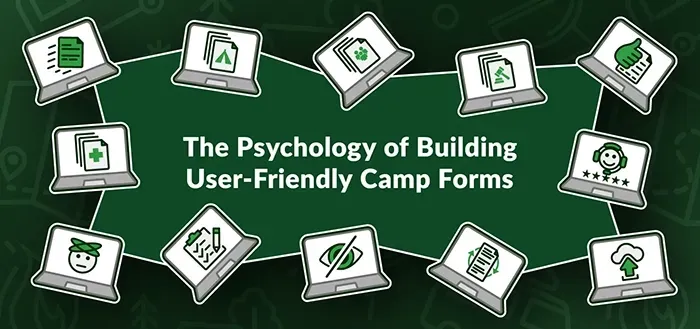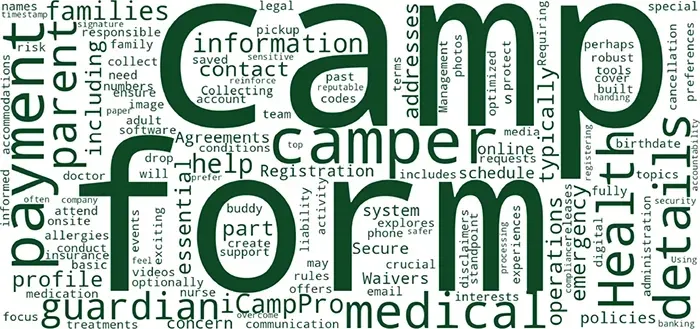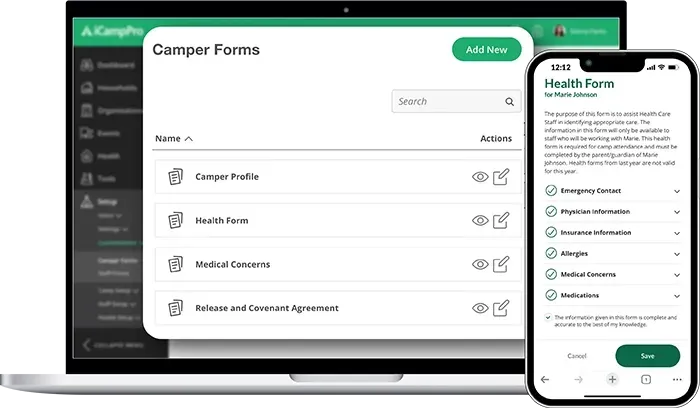Camp Forms Help–Tackling the Most Essential Item in Your Camp's Toolkit
November 13, 2024
As the camp industry grows, today’s parents increasingly recognize the importance of camps in providing more than just childcare. Camps give kids opportunities to connect meaningfully with their peers and explore a wide range of activities—from nature exploration to sports, arts, games, and even faith-based activities. There's truly a camp experience out there for everyone!
With this growth, camp demand for smart camp management software is also rising. Camps need organized, efficient ways to collect, manage, and access information about campers and their needs—and this is where camp software truly shines. From gathering camper data to standardizing workflows and automating essential tasks, camp software solutions such as iCampPro are built around the processes of collecting camp forms, efficient data management, and delivering powerful insights to camp directors and stakeholders.
Understanding the Role of Summer Camp Registration Forms
Forms are a crucial part of the success of day-to-day camp operations. The information collected from forms allows camps to streamline resource organization, facilitate effective communication, and, most importantly, help ensure camper safety. In short, forms allow camps to explore, discuss, and address the needs of campers, their families, and camp staff.
Effective form management helps camps maintain organized records, enrich the camper experience, and focus on delivering meaningful and unforgettable adventures.
Exploring Why Online Camp Forms Are Essential
It's widely understood that online forms offer several advantages over traditional paper forms.
The biggest advantage of electronic or web forms is convenience. With a web form, users can complete and submit information online from any device with internet access and a compatible browser—eliminating the need to pick up forms, rely on postal services, keep track of emails, or deal with file downloads and PDF editors. For camp families and staff, it’s as easy as pointing, clicking, typing, and submitting in just minutes.
Another key advantage is aesthetics. Digital forms are less intimidating than a stack of paper. They’re designed to present only essential information and guide users intuitively through each section. Visual elements like colors, styling, and layout can enhance the form’s appeal without traditional concerns like printing costs.
Additionally, digital information is far easier to read, complete, store, and analyze than paper-based entries. While computers aren’t inherently smarter than humans, they’re highly efficient at handling repetitive tasks and processing large volumes of data accurately. With digital forms, we can receive instant confirmation that our form has been submitted correctly and securely.
Last but not least, online camp software with form management tools (like iCampPro) can turn collected data into actionable insights, significantly boosting a camp’s productivity and overall organization.
But even with all these advantages, there’s still one challenge: most of us don’t really enjoy filling out forms—online or otherwise. Why is that?

The Psychology of Building User-Friendly Camp Forms
It’s true—most of us don’t enjoy filling out forms, especially lengthy ones. Beyond being time-consuming, the process can feel overwhelming, isolating, and unnecessarily complicated. The longer a form appears, the more likely we are to delay completing it. This is especially true for lengthy, paper-based forms, which can feel tedious and discouraging.
In addition to moving your forms online, consider these best practices when creating them:
- Limit Repetition – Avoid asking for the same information multiple times unless absolutely necessary.
- Communicate Deadlines – Set clear due dates and send friendly reminders as deadlines approach to keep users on track.
- Explain Its Purpose – Provide context at the start of the form and around sensitive questions to help users understand why certain information is being requested.
- Include Completion Estimates – Let users know the estimated time needed or include a question count, so they can gauge the effort required to complete the form.
Applying the Endowed Progress Effect
If a form is long, breaking it into sections or steps can increase engagement. Our brains are wired to enjoy a sense of progress, whether it’s finishing a chapter, checking off a task, or advancing to the next section of a form. Clear, attainable progress indicators can make a form feel more manageable.
Using Hick's Law for Simplicity
When faced with too many choices, people can feel overwhelmed and take longer to make decisions. By grouping options or limiting visible choices, you can streamline the process, reducing confusion and frustration so that users can complete the form more easily.

What Information Should Electronic Camp Forms Explore?
The information camps request in their forms will vary depending on the camp’s focus and activities. When asking questions in forms, be mindful of how sensitive the information will be stored and who will have access. There are six common types of forms that most camps use to manage family details and support campers during their stay. Let’s explore these essential forms below!
Camper Forms
Camper forms gather basic details such as name, birthdate, gender, and profile image. Many camps also include other fun facts like school grade, favorite subjects, colors, interests, or hobbies. In some cases, camper forms may ask about social or personal challenges to help staff connect meaningfully with campers.
Parent or Guardian Forms
Collecting details about parents or guardians—who are responsible for payments, communication, and camper forms—is crucial for camp operations. This typically includes names, contact information (like phone numbers, addresses, and email addresses), and optionally, a profile image or birthdate if the adult will also attend camp events.
Camper Health & Medical Forms
Camps should collect essential health and medical information, including allergies, medical conditions, special accommodations, emergency contacts, and insurance or doctor details. Camps with an onsite nurse or medical team may also need details for medication administration or emergency treatments.
As a part of our robust Health Management tools, iCampPro offers a built-in camp health form which explores all of these topics!
Camp Registration Forms
With software like iCampPro, basic camper and guardian details are saved in the family’s account as a part of their profile, so registration forms can focus on the camper’s preferences, including activity interests, past experiences, or buddy requests. This helps camps create an optimized schedule and support system for each camper.
Agreements & Waivers
While perhaps not the most exciting, waivers and agreements are essential to camp operations. They typically cover policies like payment schedules, cancellation terms, pickup and drop-off rules, camper conduct codes, liability disclaimers, and media releases for photos or videos.
From a legal standpoint, these forms help protect camps from risk and ensure families are fully informed. Requiring a digital signature and timestamp can reinforce accountability and compliance with these policies.
Secure Camp Payment Forms
Payment security is often a top concern for families registering their campers. Most parents prefer online payment systems, as they feel safer than handing over sensitive banking information on paper. Using secure online payment forms and processing with a reputable company like iCampPro can help camp families overcome their concerns.

Camp Form Templates & Tools in iCampPro
To support camps in transitioning to iCampPro and online form management, our software provides several built-in form templates that can be customized to meet your camp’s specific needs. Our intuitive camp form builder offers a range of question types and answer formats, allowing camps to preview forms as they make changes. Forms automatically incorporate your camp’s branding colors within the Registration Portal and are optimized for both desktop and mobile use.
Basic details, such as information for a responsible party, other adults, and children, are automatically collected when camp families create household accounts and add household members. Additional forms are accessible after successful camp registration within the Registration Portal. Each form can be made available over specific date ranges with specific due dates and the Registration Portal will automatically display reminders to households with incomplete forms.
Here’s an overview of the camp form templates iCampPro includes in new customer accounts:
- Camper Profile – Designed as a registration form, the Camper Profile allows households to update a camper’s profile photo, share personality traits, favorite activities, recent life challenges, identify a primary care provider, and request demographic details.
- Health Form – This comprehensive form includes multiple sections that will show users their progress as it is completed. Default sections cover emergency contacts, physician and insurance details, allergies (food, medication, and other), major medical concerns, medications, shots or immunization questions, and a Parent/Guardian Authorization statement for signature.
- Medical Concerns – A specialized form for any major medical issues, that allows camps to isolate reporting on specific needs outside of standard camper care to ensure they can provide the necessary support required.
- Release & Covenant Agreement – This example form serves as a template for creating waivers or agreements. It includes written content, a signature field for the responsible party, and an auto-populated date and timestamp.
These templates serve as helpful guides for the kinds of information camps might need during camper registration. They can be edited, customized, or used as-is based on the needs of your camp. Alternatively, camps can choose to create entirely new custom forms to support their specific operations.
If you’re interested in learning more about how iCampPro can support your camp’s form management, camper data, and overall camp organization, click on the Camp Forms button below or schedule a demo with one of our representatives today!




